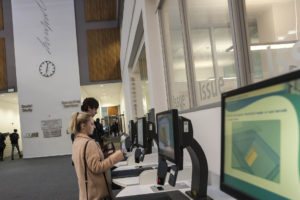Criminology
UCAS code L311
- Study mode
- Full-time
- Duration
- 3 years
- Start date and application deadlines
-
- Start date
UCAS code L311
Our Criminology degree tackles the problems of crime, deviance, victimisation and social harm in a high quality programme that makes the subject exciting and intellectually challenging.
Criminology involves the study of complex issues of crime and criminal justice. Criminologists play an important role in the criminal justice system.
You will be taught by experts who help influence and develop policy; some of the world’s most influential and respected criminologists teach and research within our Department. The degree draws on the Department’s expertise in crime prevention, surveillance, policing, sentencing, victimology, youth justice and corporate crime. Modules are continually updated and designed to provide you with a well-rounded criminology learning experience.
Our programmes are based on cutting edge research and are ideal preparation for careers or further study where clear, creative thinking is valued. From the historical foundations of crime and punishment to the implications of digitisation in social, political, economic and cultural life.

We’re proud to announce we’ve been awarded a Gold rating for educational excellence.
Discover what you'll learn, what you'll study, and how you'll be taught and assessed.
The first year of the programme provides an introduction to exploring ‘crime’ in its social, historical and political context. Getting to grips with the key concepts in criminology and its wider social scientific roots is dealt with at year one to ensure easy transition to years two and three. Our Studying society module explores the use of social science research methods and ensures that by the second year all students are fully acquainted with all the skills they need to progress in their studies.
*Some modules may not be available depending on your selected programme of study.
Programme details and modules listed are illustrative only and subject to change.
In the second year, the core modules provide a deeper coverage of the range of criminological knowledge and particular controversies in criminal justice practice. We also explore the role of the criminologist in the world of policy and activism.
Programme details and modules listed are illustrative only and subject to change.
In year three, students will have the choice to study specialist subjects in-depth and develop their independent learning. Those who opt for a Dissertation are given freedom to pursue their interest in a topic of their choice, whilst those opting for our Applied social research or Social policy project module get a chance to combine work experience with academic knowledge. We have considerable experience in combining your research interests with the work needs and aims of local agencies.
Students must choose SOCI301 or SOCI303 or SOCI347 or SOCI311 (Semester 1 only)
| Compulsory modules | Credits |
|---|---|
| DISSERTATION (SOCI301) | 30 |
| INTERCHANGE PORTFOLIO: WORK-BASED LEARNING (SOCI303) | 30 |
| CREATIVE CONSULTANT: DISSERTATION BY PORTFOLIO (SOCI347) | 30 |
| SHORT INTERCHANGE PROJECT (SOCI311) | 15 |
Programme details and modules listed are illustrative only and subject to change.
During your second year, you will study understanding crime, justice and punishment to provide you with a broader and deeper coverage of criminological perspectives and criminal justice controversies.
You can then choose 30 credits from the following options: punishment, penalty and prisons; policing; crime and social control; crime, deviance and culture; domestic and international drug policy; understanding non-profit organisations and social exclusion. If you wish to study a dissertation in year three, you can opt to take research methods modules in preparation.
By year three, you will be able to study from a range of areas that include: crimes of the powerful; community and public involvement in crime and criminal justice; the risk society; criminal victimisation; youth crime, youth justice and social control. In year three you may wish to study for your dissertation if you have completed the research methods modules. Alternatively, you can take the applied social research module and carry out a piece of research commissioned by a local agency. This offers both a great opportunity for you to study in the ‘real world’ as well as an experience that will appeal to prospective employers.
You will be taught through a combination of face-to-face teaching in group lectures and small class sessions, tutorials and seminars, which are supplemented by opportunities to get one-to-one guidance from academic staff during their weekly ‘open office’ hours. The rest of your study time will be spent undertaking directed independent study, making use of our excellent library and IT facilities.
You will also be supported throughout by an individual academic adviser. Learning is delivered in a variety of formats including lectures, seminars, workshops, tutorials, guided independent study, group work and reflective and experiential learning.
The primary purpose of lectures is to provide you with a broad introduction to key areas and debates on a given topic pitched at the appropriate level of study. The lectures aim to facilitate your reading and highlight issues to be explored during independent study time in preparation for seminars and assessment.
Seminars provide opportunities to explore particular issues and debates in greater detail in a way that supplements and builds upon the lectures. Seminars also allow for greater levels of student participation and such participation will be actively encouraged throughout the programme. Workshops frequently follow the format of seminars but they also may be used to develop particular skills in a teaching context. For example, workshops develop skills in data analysis and skills in interviewing.
Guided independent study may also feature in your learning experience. Group work is a feature of all seminar teaching and group work takes place both within and outside of formal scheduled classes.
Assessment takes many forms, each appropriate to the learning outcomes of the particular module studied. Most modules are assessed by means of a mixture of essays and examinations. Typically, a module in year two might involve a 4,000 word essay or a 2,500 word essay plus a one hour examination. Some modules are assessed wholly or in part by other appropriate means, such as the preparation of projects and individual or group presentations. The final degree class is based on year two and three marks, weighted in favour of year three marks.
We have a distinctive approach to education, the Liverpool Curriculum Framework, which focuses on research-connected teaching, active learning, and authentic assessment to ensure our students graduate as digitally fluent and confident global citizens.
The Liverpool Curriculum framework sets out our distinctive approach to education. Our teaching staff support our students to develop academic knowledge, skills, and understanding alongside our graduate attributes:
Our curriculum is characterised by the three Liverpool Hallmarks:
All this is underpinned by our core value of inclusivity and commitment to providing a curriculum that is accessible to all students.
The qualifications and exam results you'll need to apply for this course.
| Qualification | Details |
|---|---|
| A levels |
BBC |
| BTEC Level 3 national extended diploma |
DDM. |
| BTEC combinations |
BTEC National Diploma DM plus B at A level; BTEC National Extended Certificate M plus BB at A level. |
| Welsh Baccalaureate Advanced |
C in the Welsh Baccalaureate, plus BB at A level |
| Access |
Pass relevant Access to HE Diploma with 45 Level 3 credits with 27 at Distinction and 18 at Merit |
Studying with us means you can tailor your degree to suit you. Here's what is available on this course.
University of Liverpool students can choose from an exciting range of study placements at partner universities worldwide. Choose to spend a year at XJTLU in China or a year or semester at an institution of your choice.
Immerse yourself in Chinese culture on an optional additional year at Xi'an Jiaotong Liverpool University in stunning Suzhou.
Broaden your world by spending an additional year of study at a partner university abroad following your second year of study.
Take a semester of your second year of study at one of our worldwide partner institutions.
Spend a summer abroad on a study placement or research project at one of our worldwide partner institutions.
Every student at The University of Liverpool can study a language as part of, or alongside their degree. You can choose:
With a combined degree, you can study two subjects as part of the same degree programme.
Explore combined degrees for Sociology, Social Policy and Criminology courses
Your course will be delivered by the Department of Sociology, Social Policy and Criminology, in the School of Law and Social Justice Building. Students have access to state-of the-art facilities and are a short walk from the Sydney Jones Library. Based in the Knowledge Quarter, 10 minutes walk from the city-centre, students are surrounded by history and culture.






From arrival to alumni, we’re with you all the way:

Want to find out more about student life?
Chat with our student ambassadors and ask any questions you have.
We will enable you to develop a range of social scientific, analytic and communication skills and a variety of transferable skills valued by many employers in a range of industries (eg media organisations, local government and charitable organisations, the criminal justice system and commercial and financial service sectors).
Our graduates have gone on to successful careers in:
We encourage all our students to participate in SLSJ Extra, a series of talks and workshops featuring members from the legal, criminal, and voluntary sectors, as well as other leading professionals and reform advocates from the UK and beyond. SLSJ Extra demonstrates how the academic disciplines of law, sociology, social policy and criminology can open doors to a range of fulfilling professions. This foundation of extracurricular activity supports students in their future career aspirations.
We also help our students to take advantage of work experience opportunities. In your second year, you have the option to integrate work experience into your studies. By the third year, you can take advantage of work placements through our Interchange service, which connects you with various voluntary and charitable organisations within the region. You can also gain valuable volunteering experience with support from Employability & Interchange Coordinators or by participating in the Peer Mentoring Scheme.
Placements are available for Sociology, Social Policy and Criminology students, involving research projects that impact communities on both local and national levels. These opportunities are expanding each year, with this year’s research placements including collaborations with the National Youth Advocacy Service and The Heseltine Institute.
We offer a series of specialist postgraduate programmes within Social Policy and Criminology:
79% of sociology, social policy and criminology students find their main activity after graduation meaningful.
(Graduate Outcomes, 2018-19.)
Your tuition fees, funding your studies, and other costs to consider.
Full-time place, per year - £9,535
Year abroad fee - £1,430 (applies to year in China)
Full-time place, per year - £24,100
Year abroad fee - £12,050 (applies to year in China)
The tuition fees shown are correct for 2025/26 entry. Please note that the year abroad fee also applies to the year in China.
Tuition fees cover the cost of your teaching and assessment, operating facilities such as libraries, IT equipment, and access to academic and personal support. Learn more about paying for your studies.
We understand that budgeting for your time at university is important, and we want to make sure you understand any course-related costs that are not covered by your tuition fee. This could include buying a laptop, books, or stationery.
Find out more about the additional study costs that may apply to this course.
We offer a range of scholarships and bursaries that could help pay your tuition and living expenses.
If you’re a UK student joining an undergraduate degree and have a household income below £35,000, you could be eligible for a Liverpool Bursary worth up to £2,000 for each year of undergraduate study.
Apply for an Asylum Seekers Scholarship and you could have your tuition fees paid in full and receive help with study costs. You’ll need to have applied for asylum in the UK, or be the dependant of an asylum seeker, and be joining an eligible undergraduate degree.
If you’ve spent 13 or more weeks in Local Authority care since age 14, you could be eligible for a bursary of £3,000 per year of study. You’ll need to be a UK student joining an eligible undergraduate degree and be aged 28 or above on 1 September in the year you start.
Are you a UK student with a Black African or Caribbean heritage and a household income of £25,000 or less? You could be eligible to apply for a Cowrie Foundation Scholarship worth up to £8,000 for each year of undergraduate study.
If you’re a UK student identified as estranged by Student Finance England (or the equivalent UK funding body), you could be eligible for a bursary of £1,000 for each year of undergraduate study.
Joining a School of Biosciences degree and have a household income of less than £25,000? If you’re a UK student, you could apply to receive £4,500 per year for three years of your undergraduate course.
Do you live in the Liverpool City Region with a household income of £25,000 or less? Did neither of your parents attend University? You could be eligible to apply for a Nolan Scholarship worth £5,000 per year for three years of undergraduate study.
Are you a UK student with a household income of £25,000 or less? If you’ve participated in an eligible outreach programme, you could be eligible to apply for a Rigby Enterprise Award worth £5,000 per year for three years of your undergraduate degree.
Are you a UK student with a household income of £25,000 or less? Did neither of your parents attend University? You could be eligible to apply for a ROLABOTIC Scholarship worth £4,500 for each year of your undergraduate degree.
Apply to receive tailored training support to enhance your sporting performance. Our athlete support package includes a range of benefits, from bespoke strength and conditioning training to physiotherapy sessions and one-to-one nutritional advice.
Joining a degree in the School of Electrical Engineering, Electronics and Computer Science? If you’re a UK student with household income below £25,000, you could be eligible to apply for £5,000 a year for three years of study. Two awards will be available per academic year.
If you’re a young adult and a registered carer in the UK, you might be eligible for a £1,000 bursary for each year of study. You’ll need to be aged 18-25 on 1 September in the year you start your undergraduate degree.
Use our handy chatbot for your Clearing enquiries.
Last updated 17 June 2025 / / Programme terms and conditions